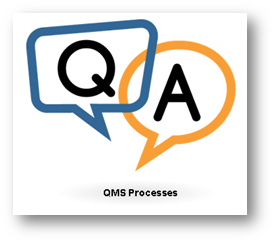QMS Questions Answered: Certification of Suppliers
|

|
There are three available options.
1. – to evaluate supplier of a particular material in accordance with the Supplier evaluation methodology established in the the Organization at specified intervals, for example, annually.
2. In case the Supplier becomes permanent by the decision of the Organization leadership to transfer the production process of a particular material to the external provider, the second and/or third options could be chosen. |
|
2.1. - conduct 2nd party annual audit of the supplier utilizing the resources of the Particular material production process Quality Assurance System internal auditors. This System should include the supplier processes that directly affect the quality of the particular material (this is – the 2nd party audit scope), such as: |
- ‘Production’, including the final inspection and preservation (the part relevant to the production process of a particular material).
- ‘Control of nonconforming output processes, products, and services’ (the part relevant to the production process of a particular material).
- ‘Design and development’ (part relevant to technological design of production process of a particular material).
- ‘Control of external processes, products and services’, (the part relevant to the purchase of equipment, raw materials, components, etc. for the production process of a particular material).
- ‘Control of Personnel’ (the part associated with the definition, provision and evaluation of the competence of personnel involved in the production of a particular material).
- ‘Control of documented information’
- ‘Contract Analysis’ (the part associated with the particular material production process outputs definition and requirements analysis).
- ‘Customer communication’ (part of the ‘Marketing’ process relevant to the involvement of the organization to improve particular material production process outputs).
|
| The requirements to the Supplier processes relevant to the Quality Assurance System of the particular material production (these are the 2nd party audit criteria): |
- definition of these processes inputs and outputs;
- ensuring the interaction of these processes with each other;
- ensuring the interaction of the outsourced process with the processes of the organization;
- definition and implementation of criteria and methods (including monitoring, measuring and relevant operation parameters), necessary for the effective execution of these processes and their management;
- determination of the resources needed for these processes, and ensuring their availability; allocation of responsibilities and authorities in relation to these processes;
- addressing the risks and opportunities associated with the implementation of these processes;
- evaluation of these processes and introduction of the necessary changes to ensure achievement of the planned process results;
- carrying out actions for improvement of these processes;
- maintenance of documented information necessary for the implementation of these processes; preservation of documented information to make sure that the processes are carried out as planned.
|
| The requirements to the personnel involved in the production of a particular material should also be the criteria of the 2nd party audit: |
- definition of the required competence;
- provision of competence;
- evaluation of the effectiveness of measures to ensure competence;
- preservation of competence evidence (basic education diplomas, training certificates, continuous education programs, internships, etc., letters of recommendation).
|
2.2. – request the supplier to develop, implement and certify a Quality Management System in accordance with ISO 9001. It is also possible to recommend to the Supplier a Certification body (or bodies) that the Organization trusts.
From the standpoint of a good practice, option #3 is preferred because:
1) It reduces the ‘likelihood’ of the Supplier’s particular non-conformant material getting into the your Organization ‘Production’ process.
2) As a result of p. 1 (above), your Organization can reduce the amount of incoming control of the particular material or even waive the incoming inspection (if you highly approve the Supplier’s QMS, including ‘Product release’ sub process).
3) You have way less "headache".
4) It is absolutely convincing for the auditors of Your Organization QMS Certification body.
|
| Find more details in Control of externally provided processes, products and services. |
|
|
| |
|
|